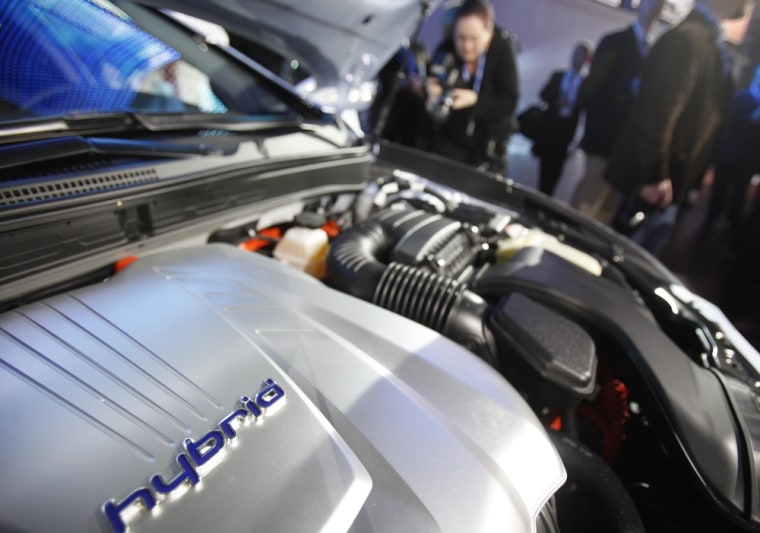There’s an ongoing debate in business over whether it's best to strive for "first mover advantage," the idea being that the pioneer in a certain market will grab huge market share before the latecomers pile in.
In the burgeoning market for automotive hybrids, Hyundai is betting it's better to come late to the party than never.
More than a decade after the launch of the Toyota Prius, the world’s best-selling hybrid-electric vehicle, the Korean carmaker is just getting ready to dip its toe in the alternative power market with its first gasoline-electric vehicle, a version of its popular new Sonata sedan.
Hyundai may be slow off the blocks, but it doesn’t intend to play catch-up for long. “We expect around 20 percent of our total sales will be hybrids, globally, in 10 years,” said Hyundai Vice Chairman Hyun-Soon Lee, during a tour of the automaker’s Namyang Proving Grounds, an hour outside Seoul.
Senior company officials say Sonata’s hybrid powertrain will soon appear under the hood of some of Hyundai's other models. Other battery-based drivetrains, ranging from so-called “mild” hybrids to plug-in hybrid-electric vehicles, or PHEVs, are also under development.
Notably, Hyundai will lift a page from the Toyota playbook. While most makers have decided to hold down costs by fitting their hybrid powertrains into existing products, such as the Ford Escape Hybrid, Hyundai plans to have "dedicated hybrids,” like the Prius and its sibling Lexus HS250h, revealed Woon-Chul Yang, president of Hyundai’s R&D operations.
A middle route
Hyundai chose to carve a middle route with the 2011 Sonata Hybrid. The automaker’s first gas-electric model (which follows a limited-edition LPG-based hybrid sold only in Korea) shares the same platform as the conventional Sonata sedan, but it gets a strikingly distinctive blacked-out hexagonal grille, unique head and tail lamps and other styling cues that will make it apparent this is the hybrid.
Meanwhile, Hyundai decided to leapfrog its competitors by skipping what is generally seen as an interim technology, replacing the nickel-metal hybrid batteries used in the Prius and other current hybrids with advanced lithium-polymer technology. Other carmakers — including Toyota, General Motors, Ford and Nissan — only plan to start using lithium polymer or lithium-ion batteries when they roll out their first PHEVs and pure battery-electric vehicles, or BEVs, later this year.
While lithium is still more costly, Yang acknowledged, it does have some critical advantages. The battery pack is about a third lighter and more compact than one using Ni-MH technology, yet stores about 20 percent more power. That means it leaves more space for passengers and cargo.
As with its competitors, Hyundai is feeling pressure to increase its use of hybrid technology to cope with consumer demand and, more urgently, with tightening government standards. The White House, for example, recently ordered a 30 percent increase in the U.S. Corporate Average Fuel Economy (or CAFE) standard by 2016, and most manufacturers anticipate a further jump for 2020.
Hyundai has promised to meet the 35.5 mpg target two years ahead of the mandate. It is working on a variety of ways to get there, including the use of lighter body and component materials, such as aluminum, magnesium and composites.
And it is downsizing its conventional powertrains. The 2011 Sonata no longer offers a V6 option, though the automaker claims that a Turbo I4 version, due out later this year, will match the performance of the old six-cylinder engine, while delivering significantly better mileage.
40 mpg on highway
And though Hyundai hasn’t yet released final numbers, the Sonata Hybrid is expected to top 40 mpg on the highway, putting it at or above the fuel economy of competitors such as the Toyota Camry Hybrid and Ford Fusion Hybrid, company insiders suggest.
While Hyundai’s hybrid program is rapidly making up for lost time, the carmaker still seems reluctant to challenge key competitors on the next stage in the electrification of the automobile. Nissan plans to launch its "Leaf" battery-powered car before year’s end, and virtually all key Japanese and American carmakers, along with many Europeans, plan to begin rolling out their own BEVs over the next several years.
For the moment, that’s not a direction Hyundai plans to go, according to Yang. Lithium batteries, he insists, “still (are) not good enough for full battery vehicles” because they cost too much while delivering only about 100 miles of range per charge. To make a battery-electric model truly competitive with gasoline power, he insisted, “We’d need seven times the level of performance at 20 times less price.”
But other senior officials quietly concede they will be watching carefully to see how the market reacts to the first crop of battery cars. And if buyers show a “social” willingness to adapt to the limitations of the technology, says Vice Chairman Lee, Hyundai may have to adapt as well, and bring the technology to market.
